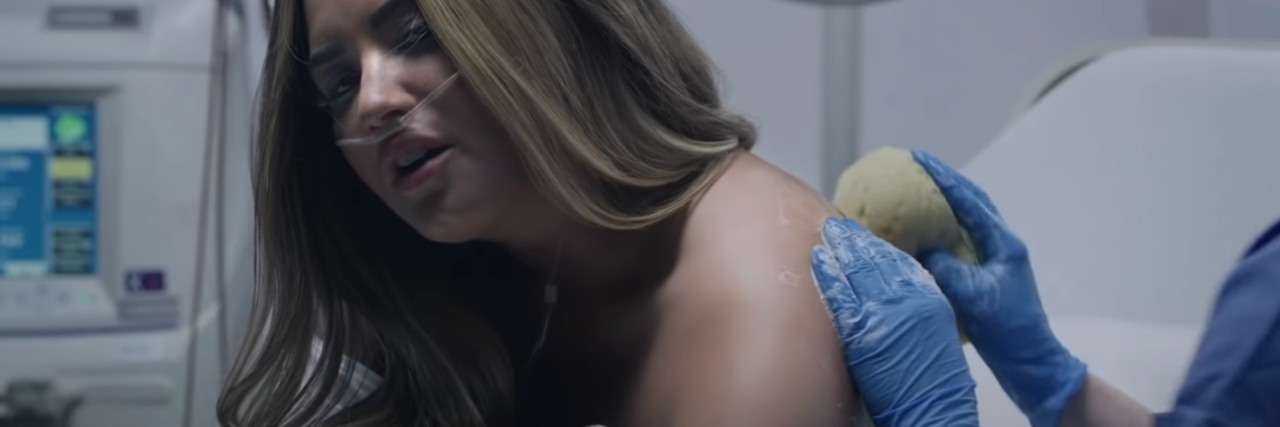Demi Lovato's New Music Video Recreates Her Overdose
Editor's Note
If you or a loved one is affected by addiction, the following post could be triggering. You can contact SAMHSA’s hotline at 1-800-662-4357.
Demi Lovato is unabashed and outspoken about her checkered past that has included addiction, self-harm, an eating disorder and other mental health struggles only exacerbated by her rise to stardom.
The 28-year-old pop singer was six years sober when she overdosed on heroin and fentanyl-laced oxycodone in 2018. At that time, Lovato survived three strokes and a heart attack due to her overdose, suffered brain damage and organ failure and was legally blind for a period.
Now, the singer is reliving those bleakest of days, depicting the dark moments in her new music video “Dancing With the Devil,” the title track from her new album out today. “Dancing With the Devil… the Art of Starting Over” is Lovato’s seventh album, and its accompanying music video premiered this morning at 12 a.m. EST.
In the video, which illustrates the night of her overdose, Lovato reprises the same green jacket and the exact same hair and makeup she wore that fateful night. The storyline chronicles her partying at a bar, and overdosing, culminating in a scene in a hospital bed.
The reviews are mixed.
The release comes on the heels of the debut of a new docuseries about the singer, released last week on YouTube. Her downtempo new single features lyrics like “It’s just a little red wine, I’ll be fine” and “Almost made it to heaven, it was closer than you know” as well as “It’s just a little white line, I’ll be fine. But soon that little white line is a little glass pipe.”
A series of teasers led up to the release of the video and album. On Twitter yesterday, a sneak peek featured a disco ball spinning over a hospital bed. As the lyric video for “Dancing With the Devil” was posted on Monday, some fans showered Lovato with praise. But others are worried the video and song may glorify drug and alcohol addiction. One TikTok user — Skatie420 — who is clean from heroin for nearly three years aired her grievances saying:
Demi Lovato recreating her overdose in a music video is the… most fucked up thing I’ve ever heard… What she’s doing is glorifying drug use and overdoses for her young audience. I’ve almost died. I’ve almost lost my arm. I’ve had so many people I love die. Me and my mom had to plan out my funeral. It’s not fun. And it’s not cute… it breaks my heart that she would promote this to children.
Another TikTok user says: “She’s literally trying to monetize off her OD and substance use issues.” And another opines: “She survived [because] she has money and access to healthcare. It’s a slap in the face to those who don’t.”
Over on YouTube, there was a warmer embrace of the new song. The comments for the lyric video were quite supportive of Lovato, not condemning it as an exaltation of drug abuse, but on the contrary, celebrating the fact that Lovato has survived, living to tell the tale.
YouTube user Bree said: “These lyrics hits you so much harder when you’re an addict too. I was a heroin addict for years. Now I’m almost [two] years sober. Thank you for being so open, honest and vulnerable with ur music.” And YouTube user Fjorni says: “True fact: Everyone who listens to this song is getting healed.”
Lovato told Entertainment Weekly that her intentions were not to glorify overdose. “Sometimes being descriptive can be triggering, but that’s the sad, sad truth of how dark it can get,” she told EW. “That’s important to give people, too.”
Lovato was diagnosed with bipolar disorder in 2015, but nowadays she says she believes she was misdiagnosed and instead lives with ADHD. She admitted recently that she still smokes weed on occasion and drinks moderately, a sentiment she relates in another new song called “California Sober,” which she explained in a recent interview on The Today Show.
“I think the term that I best identify with is California sober,” Lovato said, echoing a term originally voiced in an article in VICE. “I really don’t feel comfortable explaining the parameters of my recovery to people because I don’t want anyone to look at my parameters of safety and think that’s what works for them, because it might not.” The “complete abstinent method isn’t a one-size-fits-all solution for everybody,” she added, a view that Narcotics Anonymous, Alcoholics Anonymous among others would frown upon.
Lovato’s 2018 song “Sober” was a ballad apology to her fans, to her parents, to everyone who looked up to her. “I’m so sorry I’m not sober anymore,” she sings in a hush voice. “I wanna be a role model, but I’m only human.” She also talks about “dying inside,” and the withdrawal symptoms that go along with detoxing.
The album “Dancing With the Devil… the Art of Starting Over” is out now.
If you’d like to read up on how mental illness and substance abuse are intertwined, check out my book “The Bipolar Addict: Drinks, Drugs, Delirium & Why Sober Is the New Cool.”
Lead image courtesy of Demi Lovato’s YouTube channel.

